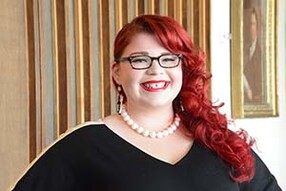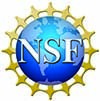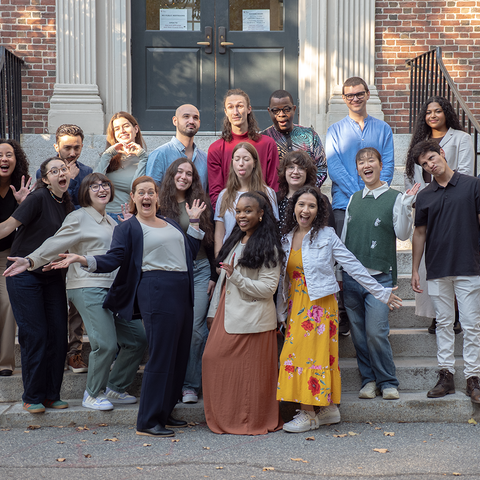It Comes with the Territory
Blythe George plans to leverage her Yurok background and Harvard education to advocate for better public policy relating to Native American reservations
Blythe George plans to leverage her Yurok background and Harvard education to advocate for better public policy relating to Native American reservations.

As anyone who’s seen a John Ford film will tell you, in the popular imagination, Native American reservations are mysterious, crime-ridden places, hostile to outsiders and home to rampant alcohol and drug use.
According to Blythe George, an Ashford Fellow and second-year PhD student in social policy at GSAS and Harvard Kennedy School, that perception is not entirely inaccurate.
For George, it reflects a long history of inequity and social injustice that makes breaking the cycle of poverty, substance abuse, and violence next to impossible for the more than one million people living on reservations in America today—and for the millions more who maintain active ties to these lands.
George, a National Science Foundation grant recipient, intends to develop and implement policies that will help those in such communities escape their circumstances. “I want to use my PhD to learn more about these places with the hope of crafting better policy to meet the needs of the people living there.”
I want to establish myself as a resource on Native Americans and on poverty policy.”
One of the challenges of conducting research on a reservation is gaining access. While George is a member of the Yurok tribe, she didn’t grow up on a reservation; when she traveled to tribal lands in Humboldt County, California, people were wary of her intentions.“With my blue eyes and red hair, it’s always amazing how much I have to establish myself credibility-wise,” she notes. She’s marked as an outsider not only by her appearance, but also by her Ivy League profile, first as an undergraduate at Dartmouth College and now as a graduate student at Harvard.
As George tells it, not growing up on the reservation probably made it easier to escape the fate of so many other Native Americans. “In my family we had domestic violence and poverty, but I went to a school where not everyone experienced that,” she explains. Nevertheless, growing up off the reservation wasn’t all positive and she knew from an early age that she would have to work hard to beat the odds stacked against her. “I wasn’t lucky enough to grow up there and learn the culture, the dances, and the language,” she shares. “For me, being Yurok had more to do with experiencing poverty, domestic violence, and substance abuse at home.”
Once she got to Dartmouth, George endeavored to learn more about her tribe’s culture and the inequities plaguing its members today. This commitment to her roots is what ultimately wins the trust of the Yurok community. “Once I tell them that I’ve been thinking of them the whole time since I’ve been gone, that usually seals the deal.”
About NSF Grants

Blythe George is a recipient of the National Science Foundation (NSF) grant. The National Science Foundation Graduate Research Fellowship Program offers multi-year financial support to graduate students in the natural and social sciences, in either master’s or PhD programs. To be eligible, students must be early in their the graduate studies, no later than the second year at the time of applying, and the NSF gives high priority to those who are able to show that their proposed project will benefit society. Applicants are chosen for their potential to make significant achievements in science and engineering.
Crafting a research proposal can be challenging, but mastering the art of writing a winning proposal is a skill that applicants carry with them throughout their careers. Support is available from faculty advisors and from Cynthia Verba in the GSAS Fellowships Office, who offers individual counseling sessions to all students. “When I applied to the NSF, I had come up with a great idea on my own, but there is no way I could have caught the reviewer’s eye without Cynthia’s careful stewardship of the first paragraph,” says Blythe George. “We spent two hour-long sessions going over every word, and I know that her effort put my application over the top, and for that, I am deeply grateful.”
For George, the change that the Yurok reservation and others like it need starts with education. “On the reservation, many kids feel like they’re not getting anything out of school,” she says. “The obstacles they face at home make just getting to class a miracle.” On top of that, the enthusiasm for school that’s present in younger children evaporates by the time they get to fourth or fifth grade. With complicated home lives and no clear way out of their circumstances, children stop viewing school as a worthwhile use of time and check out mentally. “If we could bottle and sell motivation, we’d be okay,” she says with a wry smile.
George sees education as an important target for addressing “neighborhood effects,” or the concentrated disadvantage that can result from living in a given location. She experienced the power of neighborhood effects firsthand when she spent a year working as a college counselor for a charter school on the Yurok reservation in 2012 and saw that the problems of home followed students to class regardless of their commitment to academics. Whether it was dropping out to care for a sick grandparent or coming to class bleary-eyed from watching their younger siblings all night while their parents abused drugs or alcohol, these students faced an uphill battle long before they ever entered the classroom.
The study of neighborhood effects—the force that kept her students and many of her talented peers from breaking out as she was able to—is what brought George to Harvard and to the Department of Sociology in particular. As an undergraduate, she enrolled in a writing elective called “Poverty in America,” intrigued by a class whose title resonated with her own experience. There, she first read the work of her current Harvard advisor, William Julius Wilson, the Lewis P. and Linda L. Geyser University Professor of Sociology. “It was so crazy how much it felt like I was reading about my own family and my own community, but it was also so vastly different,” she remembers. Needless to say, the sociology department at Dartmouth quickly came to feel like home to her. “Those people were asking the questions I wanted to ask.”
George decided to dedicate her studies and career to developing a better understanding of how the disadvantages associated with rural poverty differ from those of an urban environment. “We need to talk about how variations affect our theory of poverty, because that theory affects our policy,” she says. After earning her PhD, she plans to harness her connections at GSAS and Harvard Kennedy School to make her voice heard in the realm of social policy, for the benefit of the native community. “For a lot of what I’m doing, there’s no pathway already forged—that’s why I chose Harvard,” she says. “I want to establish myself as a resource on Native Americans and on poverty policy. Half the battle is getting in the room and getting people to listen to you, and Harvard Kennedy School’s legacy in DC will help me achieve that goal.”
Whether it’s in academia or at a Washington, DC, think tank, when George graduates she plans to go where she will gain the best platform for affecting change in her community and in others like it. “I want to make these places somewhere that people are proud to come from,” she says. “They shouldn’t have to choose between being economically viable or staying in the place where their families have lived for hundreds of years.”
Discuss your NSF proposal with Cynthia Verba, director of fellowships, by making a one-on-one appointment. Contact the Fellowships Office at 617-495-1814 or e-mail Cynthia Verba.
Photo by Molly Akin
Get the Latest Updates
Join Our Newsletter
Subscribe to Colloquy Podcast
Simplecast




